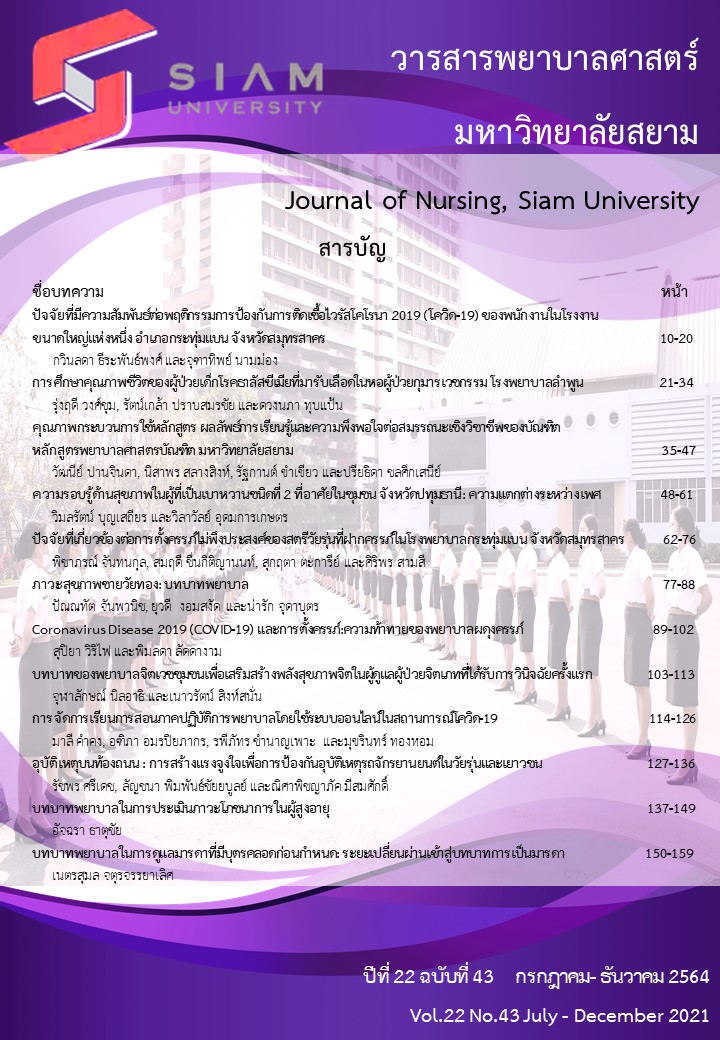คุณภาพกระบวนการใช้หลักสูตร ผลลัพธ์การเรียนรู้และความพึงพอใจต่อสมรรถนะเชิงวิชาชีพของบัณฑิตหลักสูตรพยาบาลศาสตรบัณฑิต มหาวิทยาลัยสยาม
คำสำคัญ:
กระบวนการใช้หลักสูตร, ผลลัพธ์การเรียนรู้, สมรรถนะเชิงวิชาชีพ, พยาบาลศาสตรบัณฑิตบทคัดย่อ
การวิจัยเชิงพรรณนานี้มีวัตถุประสงค์เพื่อประเมินคุณภาพกระบวนการใช้หลักสูตร ผลลัพธ์การเรียนรู้ และความ พึงพอใจต่อสมรรถนะเชิงวิชาชีพของบัณฑิต หลักสูตรพยาบาลศาสตรบัณฑิต มหาวิทยาลัยสยาม ปีการศึกษา 2561 ประชากร ได้แก่นักศึกษาชั้นปีที่1-3 จำนวน 353 คน บัณฑิตจำนวน 97 คน และผู้ใช้บัณฑิตจำนวน 40 คน เครื่องมือที่ใช้ในการวิจัย เป็นแบบสอบถาม สถิติที่ใช้ในการวิเคราะห์ข้อมูล ได้แก่ ค่าร้อยละ ค่าเฉลี่ย และค่าเบี่ยงเบนมาตรฐาน ผลการศึกษาพบว่า คุณภาพกระบวนการใช้หลักสูตรอยู่ในระดับมาก ได้แก่ 1) ความสอดคล้องของปรัชญา วัตถุประสงค์และโครงสร้างหลักสูตร 2) ความพร้อมด้านอาจารย์ผู้สอน 3 ) ความพร้อมด้านสิ่งสนับสนุนการเรียนรู้ และ 4) ผลสัมฤทธิ์ทางการเรียน ผลสัมฤทธิ์ทางการเรียนภาคปฏิบัติสูงกว่าภาคทฤษฎี ผลลัพธ์การเรียนรู้ของบัณฑิตอยู่ในระดับมาก และสูงสุดในด้านคุณธรรมจริยธรรม ความพึงพอใจต่อสมรรถนะเชิงวิชาชีพของบัณฑิตและผู้ใช้บัณฑิตอยู่ในระดับมากและสูงสุดในด้านความสามารถ ในการปฏิบัติงานตามหลักจรรยาบรรณวิชาชีพพยาบาล ผลการศึกษาสะท้อนให้เห็นว่าการประเมินคุณภาพกระบวนการใช้หลักสูตรมีความจำเป็นต่อการผลิตพยาบาลที่มีคุณภาพสู่สังคม
เอกสารอ้างอิง
เกียรติชัย เวษฎาพันธุ์, โชติ รัสชวนิชย์, วิระศักดิ์ฮาดดา, รัฐพล สันสน และ อมรรัตน์ ศรีวาณัติ. (2559). การพัฒนาศักยภาพและความสามารถด้านการบริหารจัดการของผู้นำชุมชน จังหวัดปทุมธานี ในการเตรียมความพริอมเข้าสู่ประชาคมอาเซียน. วารสารสมาคมนักวิจัย สาขามนุษยศาสตร์และสังคมศาสตร์, 21(1), 49-60.
ชัชวาล วงศ์สารี. (2558). การสอนบนคลินิกในรายวิชาการปฏิบัติการพยาบาลผู้ใหญ่สำหรับนิสิต Generation Z. วารสารวิทยาลัยพยาบาลบรมราชชนนีกรุงเทพ, 31(2), 130-140.
ณัฎฐ์นรี ฤทธิรัตน์. (2556). ปัญหาและอุปสรรคใน การพัฒนาทักษะการพูดภาษาอังกฤษของนักศึกษาไทย. วิทยานิพนธ์ปริญญาศิลป ศาสตรมหาบัณฑิต. บัณฑิตวิทยาลัย: มหาวิทยาลัยสงขลานครินทร์.
ปณิธาน วัฒนพานิชกิจ และภาวรรณ พันธ์ไพโรจน์. (ม.ป.ป.). การประเมินหลักสูตรพยาบาลศาสตรบัณฑิต มหาวิทยาลัยธรรมศาสตร์. (รายงานการวิจัย). (ม.ป.พ.).
ปภัสวรรณ จันทวงศ์, เรณุการ์ ทองคำรอด, พูลสุข หิงคานนท์ และสุภมาส อังศุโชติ. (2556). ปัจจัยที่มีอิทธิพลต่อพฤติกรรมการตัดสินใจเชิงจริยธรรมของหัวหน้าหอผู้ป่วยโรงพยาบาลศูนย์และโรงพยาบาลทั่วไปเขตตรวจราชการสาธารณสุขที่ 17 และ 18. วารสารการพยาบาลและสุขภาพ, 7(1), 75-89.
พลากร ธีรกุล. (2559). Smart Classroom (ห้องเรียนอัจฉริยะ). เข้าถึงได้จากhttp://www.gotoknow.org/post/611732
พันทิพย์ จอมศรี, อารีวรรณ กลั่นกลิ่น, อวยพร ตัณมุขยกุล และ วิจิตร ศรีสุพรรณ. (2553). การรับรู้เกี่ยวกับหลักการพยาบาลของพยาบาลในประเทศไทย. วารสารสภาการพยาบาล, 25(1), 27-36.
พิจิตรา ทีสุกะ. (2556). การพัฒนารูปแบบการเรียนการสอน โดยใช้วิจัยเป็นฐาน วิชาพัฒนาหลักสูตร สำหรับนักศึกษาวิชาชีพครู. (วิทยานิพนธ์ปริญญาปรัชญาดุษฎีบัณฑิต สาขาวิชาหลักสูตรและการสอน). บัณฑิตวิทยาลัย: มหาวิทยาลัยศิลปากร.
รัตติกร เหมือนนาดอน, ยุพาภรณ์ ติรไพรวงศ์, เจียมใจ ศรีชัยรัตนกูล และสันติ ยุทธยง. (2562). การพัฒนาการเรียนรู้ผ่านการสะท้อนคิด. วารสารวิจัยสุขภาพและการพยาบาล, 35(2), 13-24.
วัฒนีย์ ปานจินดา, สุลีมาศ อังศุเกียรติถาวร และวิภานันท์ ม่วงสกุล. (2555). การพยาบาลองค์รวมผู้ป่วยโรคหลอดเลือดสมองสู่การผลิตพยาบาลผู้มีหัวใจความเป็นมนุษย์.วารสารพยาบาลศาสตร์ มหาวิทยาลัยสยาม, 13(25), 47-54.
วิจารณ์ พานิช. (2562). การจัดการความรู้. เข้าถึงได้จาก http://www. saimak.go.th
วิชัย วงษ์ใหญ่. (2554). การพัฒนาหลักสูตรระดับอุดมศึกษา. พิมพ์ครั้งที่ 2. กรุงเทพฯ: อาร์ แอนด์ปริ้น จำกัด.
ประกาศสภาการพยาบาล เรื่อง มาตรฐานการพยาบาล พ.ศ. 2562. (2562, 18 เมษายน). ราชกิจจานุเบกษา. เล่มที่ 136 ตอนพิเศษ 97 ง, หน้า33.
Bandura, A.J. & Adams, N.E. (1977). Analysis of Self – Efficacy Theory of behavior change. Cognitive Therapy and Research, 1(4), 287-310.
Print, M. (1993). Curriculum Development and Design. (2nd ed). St. Leonards : Allen & Unwin.
Savery,J.R. and Duffy,T.M. (1995). “Problem-Based Learning ; An instructional model and its constructivist framework” Educational Technology, 35(5), 31-38.
Stufflebeam, D.L. and Shinkfield, A.J. (2007). Evaluation Theory Models and Application. San Francisco : Jossey-Bass.
ดาวน์โหลด
เผยแพร่แล้ว
รูปแบบการอ้างอิง
ฉบับ
ประเภทบทความ
สัญญาอนุญาต
เนื้อหาและข้อมูลที่เผยแพร่ในวารสารพยาบาลศาสตร์ มหาวิทยาลัยสยามถือเป็นข้อคิดเห็นและความรับผิดชอบของผู้นิพนธ์บทความโดยตรง
บทความ เนื้อหา ข้อมูล รูปภาพ ฯลฯ ที่ได้รับการเผยแพร่ในวารสารพยาบาลศาสตร์ มหาวิทยาลัยสยาม ถือเป็นลิขสิทธิ์ของวารสารพยาบาลศาสตร์ มหาวิทยาลัยสยาม หากบุคคลหรือหน่วยงานใดต้องการนำทั้งหมดหรือส่วนหนึ่งส่วนใดไปเผยแพร่หรือเพื่อกระทำการใด ๆ จะต้องอ้างอิงวารสารพยาบาลศาสตร์ มหาวิทยาลัยสยามทุกครั้ง



